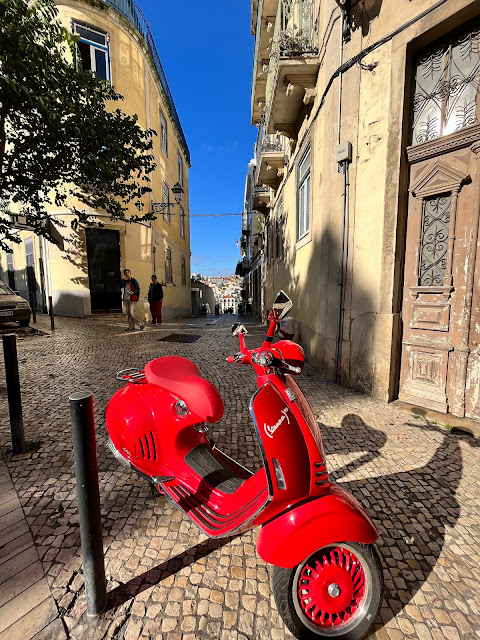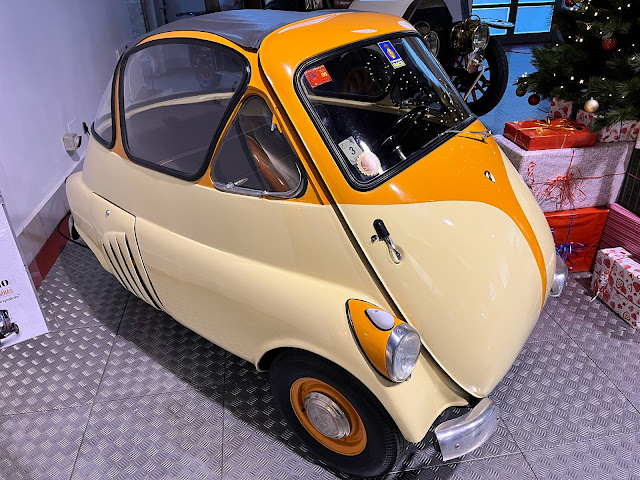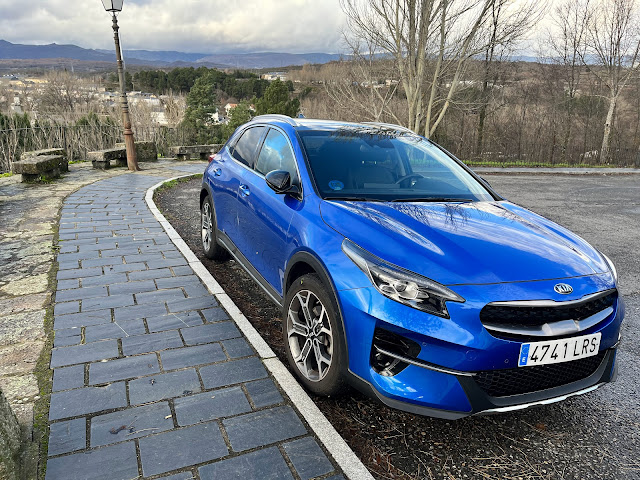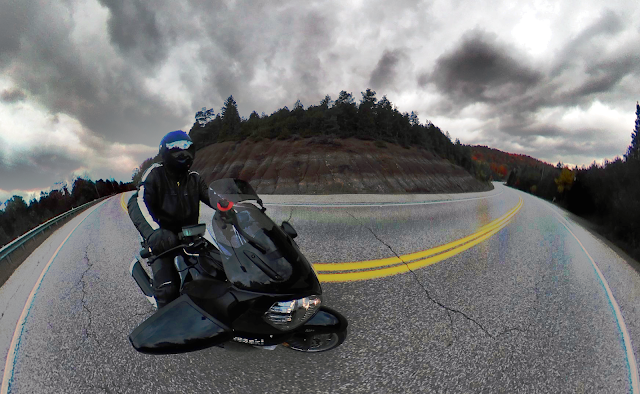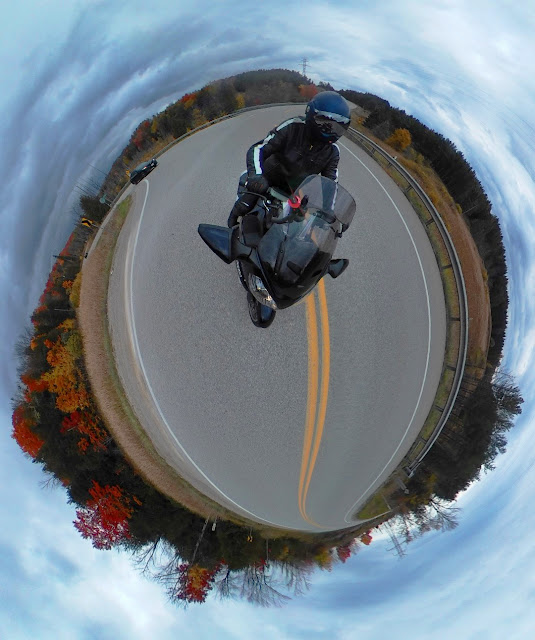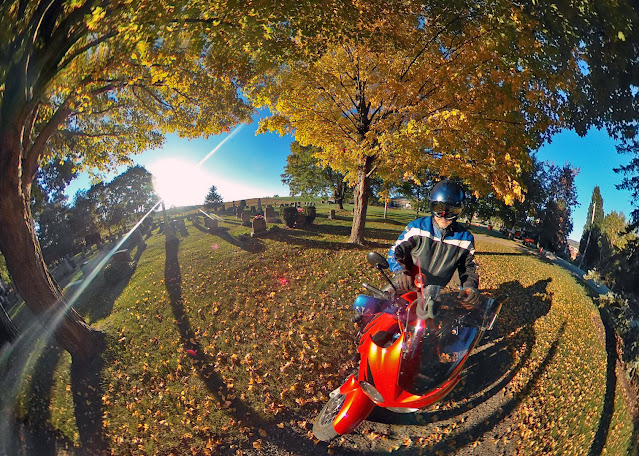You can pick up a reprinted copy of One Man Caravan on Amazon for about sixty bucks, but I did a bit better. For ten bucks I discovered an original 1936 edition in a used book jumble when we went to Pelee Island over Canadian Thanksgiving. The spine is cracked and the pages are stained with almost a century of smoke, coffee and whiskey - intrigued yet?When you take on a read like this it drags you out of your own context and into a world substantially different from the one we live in, Many people have trouble navigating this time culture shift (they like to bring their current values and fixations with them - it's a kind of temporal colonialism), but not me, I like the dissonance.
One Man Caravan is the story of Robert Fulton, an American student living in Europe who shoots his mouth off at a dinner party, saying he's planning to ride a motorbike around the world. (Un?) Fortunately for Robert, one of the people at the party owned the Douglas Motorcycle Factory and offered him a free bike to do it on. It reminded me of Charley Boorman shooting his mouth off about doing the Dakar... and then having to do it.
Another familiarity with moto-travel history is similarities to Ted Simon's Jupiter's Travels. Fullerton describes his decision to go with a motorbike: "I had considered the matter from various angles, only to arrive at the conclusion that there must be some better method of seeing that world than by the standard processes. On foot and carrying a knapsack? That would be too slow. By motor car? Too expensive. A bicycle? Too much work. A motorcycle?" Simon says something similar in Jupiter's Travels when he talks about what it takes to ride around the world.The world Fullerton navigates feels like another planet to most modern readers. No digital anything, nothing like today's transport infrastructure, and industry has yet to force everyone into similar lifestyles. We often forget how much industry defines our lives, but Fullerton comes face to face with that in 1932. The other oddity for the modern reader is just how different the immutable facts of life (like countries) change over time. The world was a very different place in 1932...
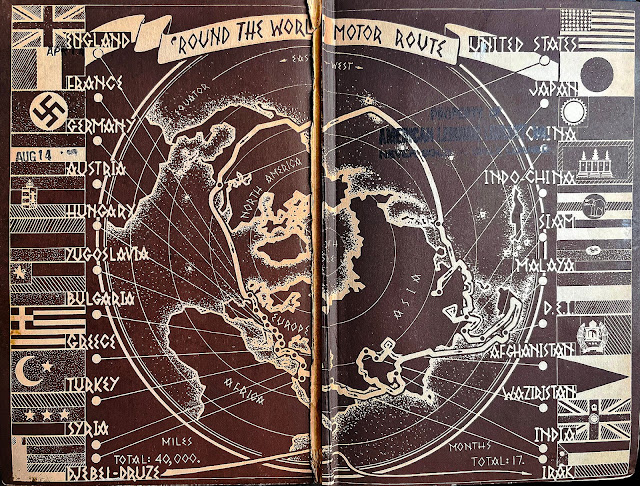 |
| The emerging chancellor in Germany was taking it into the future (Fullerton talks about how well ordered and future facing Germany is - unnerving, right?) ! I had to look up Waziristan (modern day Pakistan). |
Robert blitzes across continental Europe before pressing on into Greece and finding his way to the 'edge of civilization' in Turkey.
You'll come across a very colonial view of the world because that's how it operated in 1932, but if you can get past your temporal prejudices, this old book does a fantastic job of bringing that lost world to life. Robert finds himself in kinship with Bedouin camel train drivers who live their lives on the road (at least when he isn't being thrown in jail - the preferred way to house an itinerant motorcyclist passing through in the 1930s). He has frequent altercations with local law enforcement and the various 'agents of empire' he comes across, though his American citizenship gives him a useful separation (and a healthy irreverence) for those government interests.
By the time Robert has navigated to India he is in the zone, pushing on into Afghanistan even though every possible barrier is thrown up against him. It's in these places beyond the comforts of civilization where his fixation on trying to capture these disappearing cultures really comes into focus. Robert is very aware of how the industrial revolution is shrinking the world and remaking it in a single image. His observations about being offered tiger cubs for two dollars in Indo-China (a motorbike isn't the best place for a tiger cub) speak to the process of 'civilizing' these places.
Another quality that comes across as Robert's confidence (and writing voice) improve is his sense of humour. He starts off having a healthy respect for the status quo, but by the time he is navigating his way out of China to Singapore with no money, he is fast and loose with how things should work and much more likely to absorb the lessons the road is delivering to him.
His description of how the Chinese measure distance (in terms of ease of travel vs. distance) is particularly funny and insightful and shows you how far he'd come in terms of simply listening to the world rather than judging it:
"...the Chinese method possesses one distinct advantage over all others. It does not deal in distances but rather in 'going conditions.' For example the distance from Kaifeng to Tungkwan might be two hundred li, while from Tungkwan to Kaifeng measures only a hundred and fifty. The reason? Simple enough. It's down-hill coming back."
If you want a feeling of this lost world buried in the history of the past 90 years, the photos in the book will take you there...
 |
| Riding the streets of Shanghai in 1932... |
 |
| In Saigon, the 'Little Paris of the East' |
Whether you're a motorcyclist, a historian or a lover of travel, finding a copy of One Man Caravan is a wonderful opportunity. If you can find a survivor like I did for a song, then good for you. Right now, the only hard cover original edition available is going for $934USD (eek!).
The best follow-on is that all that film that Robert lugged around the world (and got into all sorts of trouble trying to develop along they way) is out there somewhere as Twice Upon a Caravan. I'll have to do some digging to see if I can find the complete package, it'd be something to see.
The fascinating life of Robert Fullerton:
